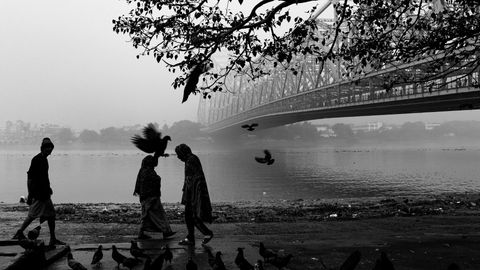After his grandfather’s passing, a writer reflects on a Kolkata that now exists only in memory—a city with the quiet ache of love and loss.
By Jishnu Bandyopadhyay Published: Jun 07, 2025 12:00 PM IST6 min read

A slow hum builds in the highways and bylanes of Ballygunge to shake off the blanket of blur that envelopes the skyline. It’s 6:30 am in Kolkata—a weekday in November, sometime in 2013. A splinter of sunlight that tricks with hopes of warmth beams through the jasmine plants in our verandah. My grandfather’s thick, black hair glimmers to break the illuminated column of dust—specs of nothing land on him like aliens that have established contact with a suitable new planet. He is about 65, and I am 13, and I do not believe him when he claims no hair dyes are involved in making his perfect mane. My untied Reeboks have his entire attention, his long fingers methodically twisting and turning the laces. I still can’t tie my shoes, and wouldn’t learn for four more years. Three loud honks shatter all calm.
“The carpool is half an hour early!” my grandmother complains, dropping freshly rolled dough into an oil-filled kadai at full tilt. “Should I pack him some biscuits instead?” he asks, and immediately regrets it with a bite on his tongue. The ride to school is not long, but my schoolmates and I have distinctly different moods. Within a few minutes, we are all laughing about something. The city outside seems to rush past, casting an illusion of speed—in reality, everyone takes their time but us. Fresh newspapers of the day rest on cycles as men drink their final cup of tea in earthen pots before the day begins for good. Someone spots a cool sports car on the street, an occurrence that would only get less rare. By the time I sit down for first period, my heart sinks as I realise I have forgotten to say goodbye to my grandfather.
Loss Over A Phone Call: A Grandfather’s Passing, Far From Home

12 years later, I hear about it just like I imagined. A phone call from Mum; she asks me how I am. Without waiting for my response, she tells me in Bengali, “Dadabhai went away.” Dadabhai, that’s what I call him—a name generally reserved for elder brothers, repurposed. I am in Bangalore, visiting my friends, and it’s a winter morning far away from my apartment in Mumbai. We have plans to tick the boxes on my must-dos while I’m there, stock up on some books at Blossoms, and then go out drinking at night. I remember my friends rushing in once they didn’t hear me in the living room, and me asking them to leave me alone for a little while. When Baba calls, almost an hour has passed, and I hear my friend cancel the reservation for lunch. “Do you want to come back?” my father asks. He has often known exactly what to say in moments of great distress. “You don’t have to if you don’t want to,” he adds hastily. I am to start at my new job in 6 days, something that has escaped my memory’s periphery. “You have to stay strong now.” I don’t go back. For months. Waiting for when it feels right.
As I’ve lived away from home, the city has tumbled into a siren of sorts. One who knows all my secrets and holds all my firsts. Like a map of time, the streetlights, footpaths and parks have unsaid records of the things that made me, and my family that came before. Mocambo remembers my first date at a restaurant, and Chinatown has seen my parents’ friend group get older and smaller. The Academy of Fine Arts knows how proudly my grandfather looks at me when I visit him in the green room, and the bar in Sector 1 (that has changed its name a few more times by now) has a vivid memory of my sister and me buying our first drinks.

By the time I consider visiting Kolkata again, my grandfather has turned into a Schrödinger’s Cat. Trapped in the riverine maze I grew up in, smouldered into places I visited with him, scribbled across dusty book stores in College Street, sitting in a bus that rushes past Rashbehari Avenue. His patina leather satchel, the one that swiftly replaced his briefcase post-retirement, still has a wallet with my photo in it—a copy of my first Passport headshot. He, for me, is preserved in a sugary illusion that threatens to break apart the moment I set foot in the city I have called home for 18 years. So I stare at the travel website’s homepage longer than necessary—the Mumbai sky is a cotton candy pink with splashes of clementine—and I make a mental note to use the word clementine more often.
Home That Lingers: Scented Walls, Backyard Trees, And Childhood Echoes

At home, at least the one where I can’t wait to go, there is a house that smells old and friends who have not fled the nest. There are Java apple trees in the backyard, their high-hanging fruits commonly bribed by my grandfather and his brother to get me to listen. A cobbled pathway that leads to a bare brick well, lined with faded streaks of moss—an area well utilised by my cousins and me to stage fairytale reimaginings and make-believe talent shows. My parents are on their way to take me to their house in Phoolbagan for the weekend, and my grandmother’s sister has packed up a bag with essentials—homework included. The highway in front of our house is not as busy as it is now, and the mall nearby hasn’t been built. At home, I look out of the second-floor window into the courtyard to notice my aunt lost in a book with the title printed in a striking red typeface. I can’t read yet, so I don’t know that it turns out to be one of my favourite pieces of literature. At home, my grandfather is at the bazaar. I am desperately praying for his return with some mangoes and jam biscuits, no shoes on. I will need his help to tie my laces.
Related: How The Festival Of ‘Nothingness’ Helped Me Find All That Mattered
Note:
The information in this article is accurate as of the date of publication.
Written By

.png)




